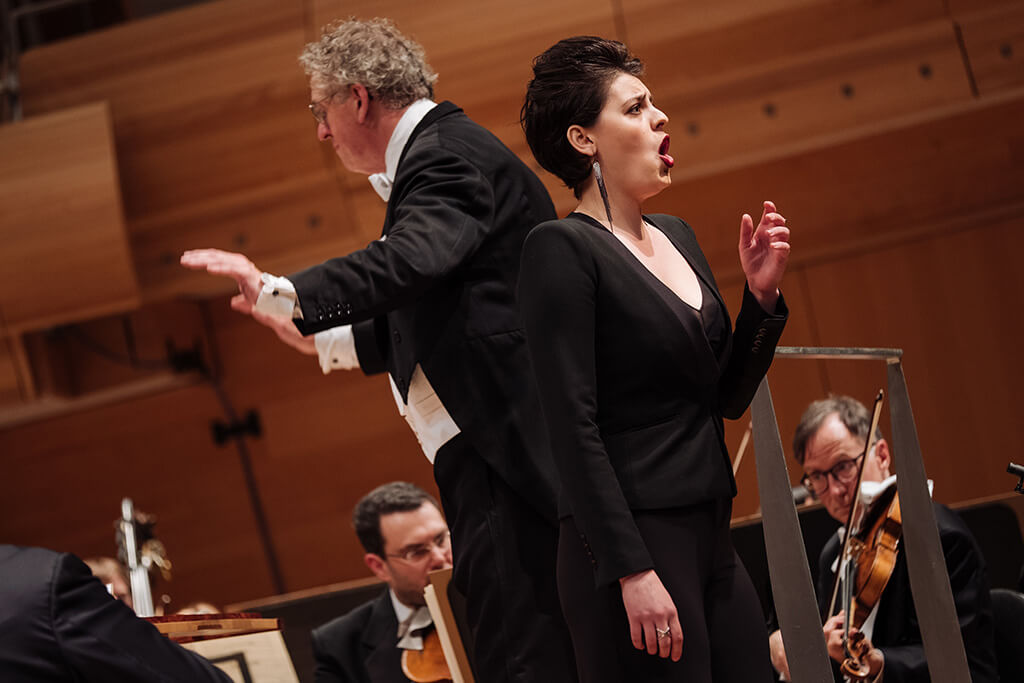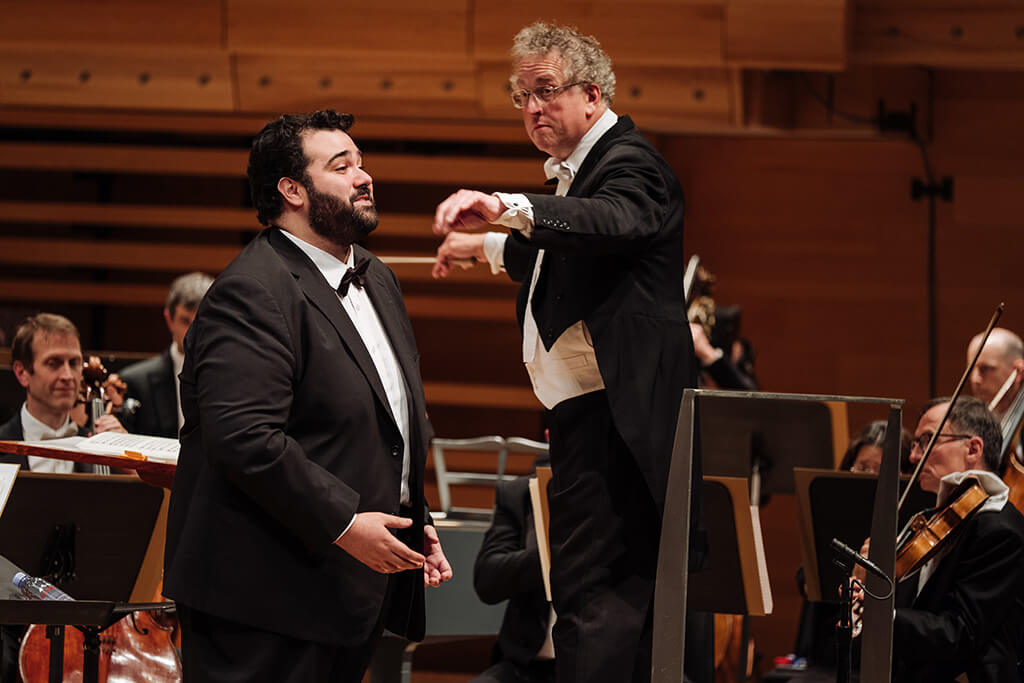
After having watched the CMIM Competitions through live streaming the past week, I finally made it to Montreal for the second week of the competition.
This afternoon, as I was sitting in Salle Bourgie for American pianist/coach Warren Jones’s masterclass, I was reminded of the 50-year-old Marvin Gaye song, Ain’t Nothin’ Like The Real Thing! To be sure, live streaming has been fantastic, but it doesn’t replace being there in person.
For one thing, listening on the web doesn’t give us any idea about the size of the voice, and how it carries in the hall. I found Salle Bourgie has what one might call a “church acoustic,” one that is overly reverberant. There is none of that in a live stream, probably due to microphone placement. While it’s great that we can see all the facial expressions and dramatic nuances on our computer screen, it isn’t the same for a live audience seeing the performance at a much greater distance. One has to be there to properly gauge the dynamic exchange between the soloist and the audience.
This evening was the first of the Aria Semi-Finals, at the (relatively) new Maison Symphonique. The hall will look familiar to Toronto opera fans, as it has the same architect – Jack Diamond – as the Four Seasons Centre. The acoustics is also very fine, without the echoey ambience of Salle Bourgie. Six singers each presented approximately twenty minutes of music, involving anywhere from three to six arias, depending on length. Songs are acceptable as long as they are orchestrated. Graeme Jenkins led the Orchestre Symphonique de Montréal.
Kicking off the proceedings was Russian soprano Dilyara Idrisova, in a program of Glinka, Bach, and Mozart. She showed off an attractive, cool timbre, exemplary flexibility with truly impressive runs, particularly in Mitridate Re di Ponto, the occasional lunging for stratospheric high notes notwithstanding. Her steady, even emission was lovely in the soprano-instrumental duo section in Zerfliesse, mein Herz from Johannes-Passion. I would have liked a bit more stylistic differentiation between the three pieces, especially the Glinka which came quite a lot later. Her diction could be clearer, although the law of acoustics is such that textual clarity becomes a challenge when sopranos sing above the stave.
South Korean baritone Kidon Choi was very impressive in the First Round, excellent in the two Italian showstoppers from Falstaff and Lucia. Here he sang Barnaba’s aria from the rarely performed La Gioconda, followed by Zurga’s aria from Pearl Fishers and ended with Pieta, rispetto from Macbeth. He possesses a booming, hall-filling sound, very Italianate in timbre, with plenty of dramatic urgency and an amazing top register. That said, this evening his singing suffered from the occasional pitch issues, sounding occasionally flat in both the Ponchielli and the Verdi, marring what was otherwise a fine performance.
I enjoyed Bulgarian tenor Mihail Mihaylov’s beautiful Kuda, kuda in the First Round, and was glad he made it to the semis. Tonight, he sang Una furtiva lagrima with plaintive tone, lovely mezza voce and good textual clarity. Cujus animam from Rossini’s Stabat Mater is a tough piece, as it goes up to a C sharp. He was cautious, and backed away from the high note, which lasted half a second and a bit flat. It was unfortunate as he as a very fine voice, in this aria his timbre even recalled the great Luciano Pavarotti. This seemed to have unnerved him, and he took a full minute with his back to the audience, probably to psyche himself up before he was ready for the last piece, Di rigori amato from Der Rosenkavalier. I am sorry to say he backing off the high notes again. Such are the vagaries of voice competitions!
Emily D’Angelo & Andrew Haji
Canadian mezzo Emily D’Angelo was next. She already won the Met Auditions at 21. Now only 23, she is singing major roles but still young enough to compete. She sang Dorabella’s Smania implacabile from Cosi with gleaming tone and temperament to burn. An aria from Ariodante was marked by fabulous fioritura, rhythmic precision and long breath-line. The audience gave her a rousing ovation, the first genuine bit of excitement of the evening. She finished with three Alban Berg songs from Sieben frühe Lieder, a favourite song cycle of mine. It can be sung by both sopranos and mezzos, and D’Angelo showed off a great high register in the climactic high B in Die Nachtigall. Her Traumgekrönt was equally lovely, although I would have preferred a more hushed high piano. It there was a blemish, it was not from the mezzo but from the orchestra. Perhaps due to insufficient rehearsals, there were surprisingly messy instrument balances in both Traumgekrönt and Sommertage.
Canadian tenor Andrew Haji followed with an absolutely glorious Alfredo’s De’miei bollenti spiriti, a role he has already sung on stage. He also sang Tamino’s Dies Bildnis perfectly, with elegant tone, great German diction and excellent sense of pitch. It helps that he has already sung both complete roles on stage! He expressions in these two arias were highly nuanced and detailed, something that only comes with experience. The aria “Je crois entendre encore” is a piece that requires excellent technical control, and he did it very beautifully. However, I was surprised he omitted the last line, which rises to a pianissimo high B, sometimes sung in falsetto. Granted this line was not in the original Bizet but interpolated later by tenors. But like the E-flat in Sempre libera or the high B in Federico’s Lament from L’Arlesiana, avid opera fans like me do miss it. Haji concluded his program with En fermant les yeux from Manon, sung with sweet tone and lovely mezza voce. Full marks for Mr. Haji.

The final competitor was South Korean bass Jongsoo Yang, who began with Non piu andrai from Nozze, sung with wonderful, youthful tone. He followed with a very impressive La calunna from Barbiere. With all due respect to Mr. Yang, to my ears, his voice at 28 is more that of a bass-baritone. That said, bass voices take a long time to mature, so he may well become a “true” bass in the future. For now, he’s a very impressive low voice singer with a spectacular high register, coupled with a tall and attractive stage appearance. The only fly in the ointment was his choice of the bass aria from Handel’s Messiah, the only piece where his fast vibrato (bordering on tremolo) became evident. In spite of this misfire, it was a very fine performance.
There you have it – the first half of the Aria Semifinals. I think I can say without bias that top honours of this session belonged to the two Canadians, Emily D’Angelo and Andrew Haji. I look forward to the second half of the Semis on Tuesday June 5. You can watch the competition live on CMIM’s website, its Youtube channel, or its Facebook page.
ALSO READ
11 Canadian novels that classical music lovers should read
- OPÉRA | Dix productions du Metropolitan Opera dans un cinéma près de chez vous cette saison - 24 septembre 2019
- CMIM 2018 | Great Voices and Some Surprises Make An Exciting Finish - 10 juin 2018
- CMIM 2018 | Six Singers Move On To Aria Finals - 6 juin 2018



